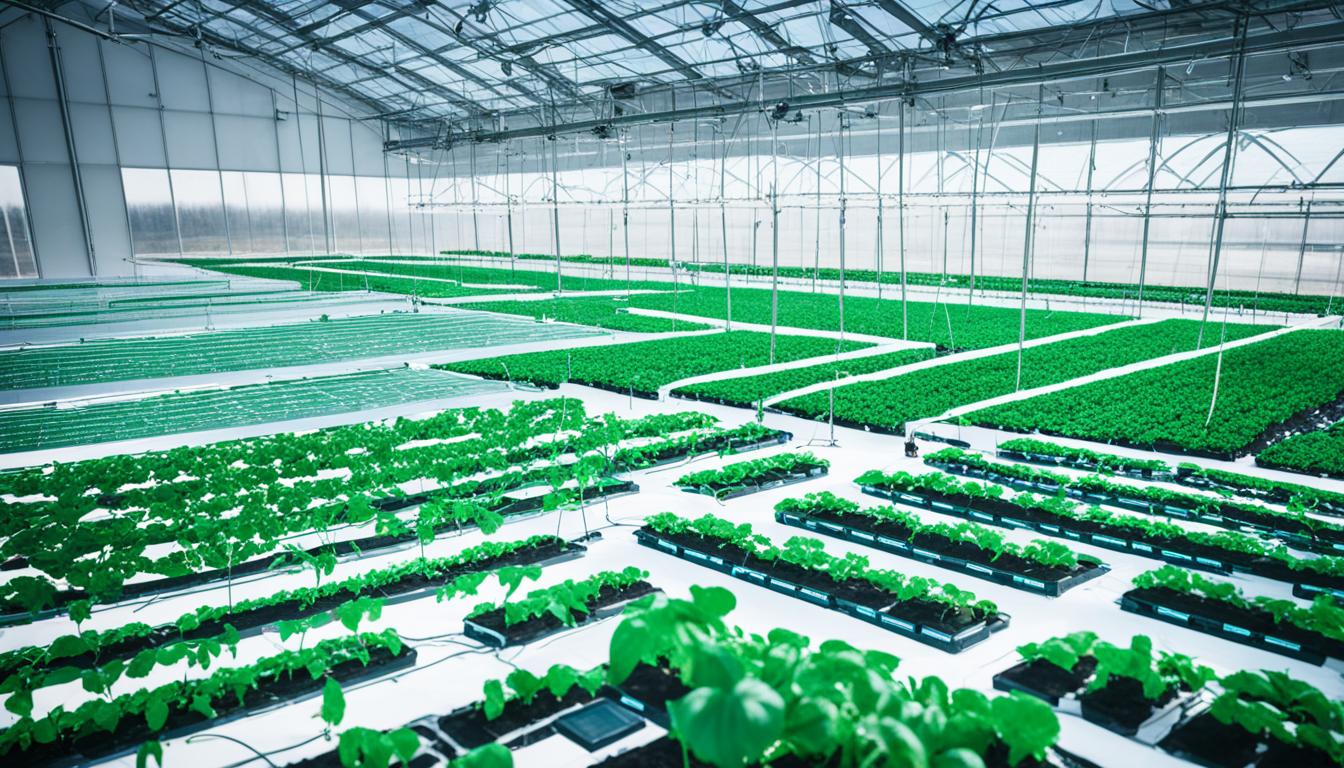In recent years, the integration of Artificial Intelligence (AI) in agriculture has revolutionized traditional farming practices. But did you know that AI-driven agriculture is projected to reach a staggering market value of $2.6 billion by 2026? This statistic underscores the immense scale and impact of AI in transforming the agricultural industry.
AI-driven technologies, such as precision agriculture and smart irrigation, have enabled farmers to optimize resource allocation, enhance productivity, and ensure environmental sustainability. From precision farming to autonomous machinery and supply chain optimization, AI has paved the way for smart farming practices that maximize efficiency and minimize waste.
In this section, we will explore the various applications of AI in agriculture, uncovering its potential in precision farming, soil health monitoring, crop management, autonomous machinery, and more. By leveraging AI, farmers are able to make data-driven decisions, optimize crop yield, and contribute to a more sustainable future for the global food system.
Key Takeaways:
- AI-driven agriculture is projected to reach a market value of $2.6 billion by 2026.
- Precision agriculture and smart irrigation are key applications of AI in farming.
- AI in agriculture enables resource optimization, enhances productivity, and ensures sustainability.
- Data-driven decision-making and autonomous machinery are key components of AI-driven farming.
- AI plays a crucial role in shaping the future of the global food system.
AI in Smart Irrigation: Maximizing Water Efficiency
The integration of AI in smart irrigation has revolutionized water usage in agriculture, leading to enhanced water conservation and optimized crop yield. Utilizing AI-powered smart irrigation systems, farmers can leverage real-time data collection, predictive analytics, and automated decision-making to ensure efficient water management.
This innovative approach to irrigation not only maximizes crop yield but also contributes to environmental sustainability by reducing water wastage. Through AI-driven smart irrigation, farmers can optimize water usage based on crop-specific requirements, leading to significant water conservation.
Key Features of AI in Smart Irrigation
- Real-time data collection: AI-enabled sensors collect data on soil moisture levels, weather conditions, and plant health.
- Predictive analytics: Advanced algorithms analyze collected data to forecast water requirements and optimize irrigation schedules.
- Automated decision-making: AI algorithms make real-time decisions to control irrigation systems, ensuring precise and efficient water distribution.
- Crop-specific recommendations: AI models provide farmers with tailored recommendations based on crop type, growth stage, and weather conditions, further optimizing water usage.
By leveraging these key features, AI-driven smart irrigation enables farmers to find the perfect balance between watering crops adequately and avoiding over-watering or water scarcity.
The impact of AI in smart irrigation is evident in ongoing projects such as IBM’s Project Flourish, the SWIIM System, and Seeed’s SenseCAP M1. These projects utilize AI and IoT technologies to improve water management, enhance crop health, and eradicate water waste in agriculture.
Furthermore, studies and reports highlight the benefits of AI-driven smart irrigation:
“AI-powered smart irrigation systems have resulted in substantial water conservation, with up to 30% reduction in water usage in agricultural practices.” – Study on AI in Agriculture, 2021
Table: Statistics on AI-driven Smart Irrigation
| Statistic | Data |
|---|---|
| Estimated market size of AI-driven smart agriculture | $X billion |
| Projected compound annual growth rate of AI-driven smart irrigation systems | X% |
| Water savings achieved through AI-powered smart irrigation systems | X million gallons |
These statistics demonstrate the significant potential of AI in transforming water usage in agriculture and its positive impact on crop yield optimization.
The future outlook for AI in smart irrigation is promising. Advancements in AI technology, coupled with increasing awareness of water scarcity and sustainable farming practices, drive the adoption of AI-driven smart irrigation systems. This not only ensures better resource management but also prepares the agricultural industry for future challenges in water conservation and crop production.
Conclusion
The integration of AI in agriculture holds great promise for sustainable and efficient food production. By leveraging AI-driven technologies, such as precision agriculture and smart irrigation, farmers gain the tools they need to optimize resource use, reduce environmental impact, and enhance overall productivity. With the global population projected to increase, the adoption of AI in agriculture becomes crucial for ensuring food security and mitigating the challenges posed by climate change.
AI in agriculture enables farmers to achieve resource optimization, increased crop yield, and cost efficiency. This technology also contributes to environmental sustainability by addressing water scarcity, reducing waste, and promoting responsible farming practices. By employing AI-driven solutions, farmers can strike a balance between economic viability and ecological responsibility.
The future of farming lies in embracing AI as a fundamental aspect of agricultural practices. As the world faces increasing pressure to meet rising food demands, AI will play a crucial role in shaping the global food system. By enabling sustainable farming practices and empowering farmers with data-driven insights, AI has the potential to create a more resilient and sustainable agricultural industry.
In conclusion, the integration of AI in agriculture opens up new opportunities for sustainable food production, resource optimization, and environmental stewardship. By embracing AI-driven technologies, the future of farming holds the promise of increased efficiency, reduced environmental impact, and enhanced productivity for a more sustainable and food-secure world.

Leave a Reply